- Home
- Rudy Rucker
Transreal Trilogy: Secret of Life, White Light, Saucer Wisdom Page 7
Transreal Trilogy: Secret of Life, White Light, Saucer Wisdom Read online
Page 7
—Jean-Paul Sartre, Nausea
Chapter 8: Tuesday, October 1, 1963
“For one thing,” said the political science teacher, “I’m sure that all of us here agree on the basics. We’re all liberal Democrats. Is there anyone here who isn’t?”
Conrad and the only other Southern boy raised their hands. The other boy had red hair and came from Mississippi. The teacher called on him first.
“Liberalism has just about ruined America,” the red-haired boy drawled. “The conservative philosophy is not only for fools and bigots. It represents the only truly progressive response to the realities of the late twentieth century.”
The other students tittered, and the teacher smiled. He was extremely tall and skinny. He wore a tweed jacket and a hand-tied bow tie. “Very well, Pound. And what about you, Bunger?”
This was the first time that Conrad had spoken up in any of his college classes. His heart was beating so hard he could hardly speak. He wanted the teacher to like him.
“Well, I believe in anarchy, Mr. Bonner. Isn’t that really the best system? I mean, politics is always so dirty. Wouldn’t we be better off if everyone in Congress was shot, so they’d leave people alone?”
There was a silence. Professor Bonner frowned. A prim-faced boy in a work-shirt turned to glare at Conrad and then raised his hand.
“Yes, Pennington?”
“Anarchy is the absence of a political system, sir. There’s no point in discussing it here.”
“Very good.”
Conrad’s face burned. After class a very short, dark-skinned boy came over and spoke to him.
“Where are you from?”
“Louisville.”
“In Kentucky?” The boy blinked and adjusted his glasses. “I’m from Long Island. Chuckie Golem. You going to have lunch?”
“Sure.”
Over lunch, Golem told Conrad about his roommate, a wild character called Izzy Tuskman. The boys discussed the few girls whose names they knew. It turned out that Chuckie lived in the same dorm as Conrad.
“You want to play some Frisbee?” Chuckie asked as they ambled back from lunch. He seemed so kind and gentle.
“What’s Frisbee?”
“It’s a plastic flying saucer. You throw it back and forth.”
“OK. Though I do have a lot of homework.”
“Just a half hour, it’ll do us good.”
It was a brilliant October day, hot as summer. Chuckie patiently demonstrated the Frisbee until Conrad was able to throw it a little.
“The Frisbee looks neat when it hovers against the sky,” observed Conrad presently. “It’d be perfect for a UFO movie. Did you see Earth versus the Flying Saucers? It came out in 1957, the same year as Sputnik.”
“I didn’t go to those movies,” said Chuckie. “I listened to folk-music instead. I guess they have a lot of UFO sightings in Kentucky?” The precise, hesitant way he said, “Kentucky,” made it sound wild and unpredictable—if not actually crude and benighted.
“Waal, shore,” said Conrad, putting on a hick accent. “There’s a gentleman down the road from where we lived—old Cornelius Skelton—he always tells as how one night he seed a flying saucer make off with one of his hawgs. He fired on it, but twarnt no use. Only good come out of it was next day Cornelius found him a big mineral crystal spang where the space vehicle had landed! Still hot, it was. Mr. Skelton keeps that crystal on his mantel, for to show folks. I’ve seed and touched it myself, I have.” The story was more-or-less true, but Chuckie didn’t seem to understand that it was supposed to be funny as well. If anything, he looked a little sorry for Conrad. Conrad wished he hadn’t told the story. The fact of the matter was that, for whatever reason, he thought of Mr. Skelton’s crystal quite often.
They threw the Frisbee some more while Conrad tried to think of something else to talk about. “What’s that around your neck?” he asked finally. Chuckie wore a kind of silver tube attached to a chain around his neck.
“It’s a mezuzah.” Chuckie laughed happily at Conrad’s confusion. “A religious thing, against the Angel of Death. I’m Jewish.”
“Oh, are you?” In his embarrassment, Conrad dropped the Frisbee. He’d never met any Jews before, though he’d heard his brother Caldwell talk about the ones he’d met at college. Caldwell said Jews were untrustworthy.
“You don’t look Jewish,” Conrad said politely.
“Are you kidding?” Chuckie gave his dry, humming laugh. “That reminds me of a joke. There’s a guy on the train, right, and this old Jewish woman keeps coming up to him and asking, ‘Are you Jewish?’ ‘I’m not Jewish,’ the guy says, ‘so leave me alone.’ ‘Are you sure?’ says the woman. ‘Are you sure you’re not Jewish?’ She keeps doing this for about an hour, right, so finally he gives up and says, ‘All right, lady, I admit it, I’m Jewish!’ Big pause, and then she says, ‘Funny—you don’t look Jewish.’”
“That’s good,” laughed Conrad. This sure was different from Louisville.
“There’s a lot of Jewish jokes. Jewish humor. Have you read Stern? By Bruce Jay Friedman?”
No.
“I’ll lend it to you. It’s a panic.”
Over the next week, Conrad came to realize that most of his new Swarthmore friends were Jewish. His roommate Ron Platek, and Cal Preminger across the hall, and most Jewish of all, Chuckie and his roommate Izzy Tuskman.
Tuskman and Golem had been wrestling stars at different Long Island high schools. This was one sport that Swarthmore competed seriously in, so the two had been recruited and billeted together in a one-person room. To make space for their desks, the college had installed bunk beds. Often, after supper, Conrad and Preminger would squeeze into Tuskman and Golem’s room to trade jokes and insults. They all liked to tease Conrad for not being Jewish.
“Hey, Conrad, you know what schmuck is?” This from Tuskman, a five-foot two-inch, thick-lipped elf who looked and talked like Chico Marx.
“Well, in German it means ‘ornament.’”
“He even speaks Kraut,” marveled Golem.
Conrad knew some German from listening to his mother’s relatives. “Ornament,” he repeated. “Like jewelry, you know?”
“Dat’s poifect,” exclaimed Tuskman. “Ohnament.” He doubled over in glee. His whole face squeezed into lumpy wrinkles. “Ohnament,” he gasped. “Tell him, Chuckie.”
Chuckie had a more scholarly demeanor than his roomie. “Schmuck in Yiddish means ‘penis,’” he explained, adjusting his glasses for emphasis. “If you call a person a schmuck, it means you think he’s a jerk.”
Tuskman had fallen onto the floor now, and the kicking of his legs drove him around and around in a small circle. “Ohnament. Ohnament.” Conrad felt a little put-upon. No one had ever called him a Kraut before. He wished he were Jewish, too.
“Come on, Conrad,” said Izzy, still giggling on the floor. “Don’t be an ohnament.”
It was fun having strange new friends, but it was just as much fun to go off and be alone whenever you liked. Conrad felt like he was really getting to know himself. He liked to walk down into the Crum woods, or sit with his books on some isolated corner of the great front-campus lawn. When his parents had brought him to Swarthmore on a tour-of-the-colleges last year, Conrad had been impressed at the sight of blue-jeaned students sitting on the lawn with books. And now that was him.
He didn’t study too much out there; mostly he just looked at the clouds and trees, the birds and the squirrels. One day a squirrel got mad at him—he was leaning against its tree, and perhaps it wanted to come down—the squirrel got mad and began making noises at Conrad. Odd, chirr-chucking noises; it was a noise he’d heard in trees before, but he’d never realized that it was squirrels doing it. He threw sticks at the squirrel to keep its scolding going. The noise sounded almost like speech, and faint memories of some higher-energy language flitted
across Conrad’s mind.
Often, thinking or studying, he had the feeling of being close to some great realization. He’d forgotten something, something big, but always it escaped him. He felt closest to the big answer when, staring up at clouds, he forgot himself entirely. It was so sweet to be a creature living here on Earth.
Conrad didn’t pay much attention to his roommate, Ron Platek, for the first few weeks. The guy was clearly a schmuck. Tall, uncoordinated, thick-lipped, hook-nosed, he wore heavy black glasses with Coke-bottle lenses. He looked and acted like an old man. He came from Brooklyn. Seeing Ronald William Platek’s address on the list of roommates, Conrad had expected him to be black. Platek, for his part, had expected Conrad von Riemann Bunger to be a Nazi. They finally got to be friends when they rearranged the room’s furniture.
“Push that desk over there, Conrad. I’m sorry I can’t help you, I’ve got a bad back.”
“OK, Ron. That looks good, doesn’t it? How about putting the bookcases together like this?”
“Beautiful. Would you help me nail up my bulletin board?”
“Sure. Do you think we could get some travel posters?” Caldwell had had travel posters in his college room.
“Please, no travel posters. This isn’t the University of Kentucky, Conrad. How about some art reproductions from the bookstore?”
“Yeah.”
They got in the habit of having long talks in the dark, after going to bed. They were both such provincials—each in his own way—that each found the other’s strange accent endlessly fascinating. Ron had an insatiable appetite for facts about the Southern high-school scene, and Conrad did his best to make it sound interesting. In return, Ron would tell about his gritty life in Brooklyn.
Ron’s parents were poor immigrants who’d fled Poland to escape Hitler. The neighborhood they’d settled in was half-black and very tough. Ron had been robbed at knifepoint several times. One of his friends had an older brother who’d paid a woman to shit on his chest. The parks were full of junkies, and the sidewalks were littered with used rubbers. “Some of these guys have no mind, Conrad. With the mouth you got, you wouldn’t last two days.”
Eventually, Conrad got on to the inevitability of death, and they both grew mournful at the prospect of dying without ever getting laid. “With my luck,” complained Ron, “my wife will be frigid. Can you believe that? I’m working my ass off, and the whore won’t put out. I’ll kill her!”
After a while, the only thing Conrad didn’t like about Ron was his first name. Finally, one night, an appropriate nickname hit him. Ron was tossing in his bed, worrying about a big astronomy test, and suddenly Conrad had the image of Ron as a great dingy platter with food sliding back and forth. “Hey, Platter,” he giggled. “What toothsome victuals do you bear?”
“What are you talking about, Bunger?”
“That’s your name. That’s what I’m going to call you. Platter.”
“Fuck you.”
“You can call me Platter, too. We’ll be like the Jackson twins.” Conrad was referring to a newspaper comic strip about twin teenage girls.
“Oh, my god, the Jackson twins. With the little brother—Termite?”
“Yeah.”
“Christ, what I’d give to fuck the Jackson twins. Even just one of them. I’d give my left dick.”
“I remember I actually jacked off on a Rex Morgan comic strip once. There was this real hot woman waiting for Rex in a motel room. You could see her thighs.”
“Jesus. Soft, creamy thighs quivering with uncontrollable lust.”
Another night, they got onto the differences between the Jewish and Christian religions.
“Is it true that you all are still waiting for a Messiah?” asked Conrad. “I read somewhere—I think it was in Ulysses—that every time a Jewish man has a son he’s all excited thinking it might be the Redeemer.”
“Ah, that’s bullshit.”
“Did you know that Christ was really a Jew, Platter?”
“Of course! What do you think the Last Supper was? Pesach! The feast of Passover. My family does it every year. Real good food, Platter, you ought to try it.” Platter paused in fond recollection, then went on. “Sure, Christ was a Jew. A nice guy like me! My father’s a carpenter, you know, he lays parquet floors.”
“What if you were the Messiah, and you didn’t even know it? What if you thought you were a regular person, but you were really something else?”
“Guys like you and me don’t have to worry about that, Conrad. Nobody thinks we’re regular persons anyway.”
Chapter 9: Friday, April 10, 1964
Conrad took all the LifeSavers out of the package and shuffled them around on the desk. He closed his eyes, picked one, and tried to guess what color it was. Couldn’t tell. Took it out and looked at it: green. For a second he couldn’t remember what green was supposed to taste like.
His attention wandered back to the paper in his typewriter. Page nine. The fine arts teacher had insisted that all papers be ten to fifteen pages in length. Conrad had been up all night trying to satisfy him. It was 7:15 and the papers were due in class at 8:00. Everyone was supposed to write about the new science library.
“All in all,” Conrad typed desperately, “the new science library is a real plus for the Swarthmore College campus. As one cute freshman coed was heard to say, ‘Wow! This building really turns me on!’”
Still just nine pages. Struck by sudden inspiration, Conrad rubbed the page numbers off the Corrasable Bond page-corners and then retyped them, skipping the number 4. That brought him up to ten pages. He went by the fine arts class, laid his paper on the teacher’s desk, and headed back to his dorm. He didn’t want to think anymore. He wanted to sleep.
When Conrad woke, it was late afternoon. He’d been dreaming about flying. For the thousandth time he thought back to the time he’d flown out over the Ohio River. That had really happened, hadn’t it? But now, here at Swarthmore, he never felt any of the old power. He was just an awkward Kentucky boy with not too much to say for himself. He winced, recalling the wretched climax of his art paper. Another C for sure.
At least it was Friday. And tomorrow was spring vacation. Conrad was planning to get drunk tonight. There was going to be a bonfire party down in the Crum woods, and he’d arranged for an older student to get bottles for him and Platter. The pickup was supposed to be at five.
Looking to kill a half hour, Conrad wandered out of the dorm and into the quad. There, sitting on some stone steps, was Izzy Tuskman. He was drawing a detailed sketch of a still-leafless Japanese shrub. The rendition was excellent. Tuskman seemed to twinkle with energy as he looked—really looked—at the strangely twisting branches.
“That’s a good drawing, Izzy.”
Long silence. Tuskman was not averse to milking a moment for all it was worth. “Sure,” he said finally, looking over with a shrug and a quick smile. “I’m an ahtist. Did you finish your paper?”
“Yeah, it’s terrible. It took me all night. I’m going to get drunk.”
“Wit what?”
“I’m getting a pint of vodka from Oates. And some Manischewitz for Platter.”
“Manischewitz?” Izzy’s face tensed in silent laughter. With his mouth open in the pale spring sun, he looked for all the world like a lizard. “Ron is an old Jewish man.”
“Oh, he’s OK. He’s funny. Look, I’ll go get the stuff and pick you up here. We can go to my room and get loaded before supper.”
“Wonderful.” Tuskman turned his attention back to his picture. When Conrad returned in twenty minutes, Izzy was in exactly the same position. The drawing had acquired more detail and more shading; it seemed done.
“Got it?” said Izzy, getting to his feet.
“Yeah. But it cost more than I expected. I don’t have any money left for mixer.”
“My treat,” said Izzy expansively.
Conrad followed him into the dorm basement where the vending machines were. No one else was down there. Izzy set down his drawing pad and kicked the glass out of the cigarette machine. “Help me turn it over, Conrad.”
They turned the machine upside down, and all the change came out of the change box. You could reach in through the broken-out glass and get money, and cigarettes, too. Izzy bought them three orange sodas, and Conrad took sixteen packs of cigarettes, all brands. They went back to Conrad’s room and made themselves drinks.
Just about then, Conrad’s roommate showed up.
“Come in, Platter, my good man!” exclaimed Conrad. “Welcome to the Kentucky Tavern.”
Platter glanced around, taking in Tuskman and the sixteen packs of cigarettes. “Are you the guys who broke the machine?” he demanded. “I was just down there.”
“Here’s your wine, Ron.”
Briefly mollified, Platter studied the Manischewitz label. It had a picture of a white-haired old Jewish man with phylacteries.
“He looks so wise,” marveled Platter. “He looks like one of the six sages on my postcard.” On Platter’s bulletin board there was a color picture of six robed rabbis sitting at a table. They all had white beards. Conrad was tired of hearing how smart they were. How could Platter believe in them, when Conrad couldn’t believe in anything?
“Those guys don’t know anything,” he told Platter flatly. “They’re not sages. They’re stupid old men who can barely talk English.” He was really saying this for Izzy’s benefit.
“I’d like to see you tell them that,” shouted Platter. He pulled the postcard off the bulletin board and shoved it in Conrad’s face. “I’d like to see you walk up to that table and tell those guys they don’t know anything! Meshuggeneh gonif! Crazy thief!”
“Take it easy,” interjected Izzy.

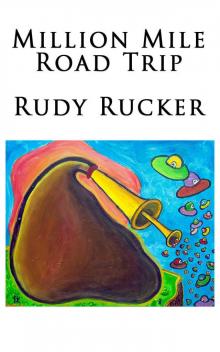 Million Mile Road Trip
Million Mile Road Trip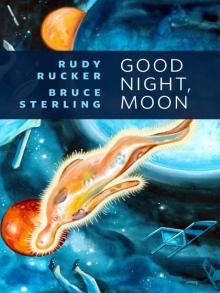 Good Night, Moon
Good Night, Moon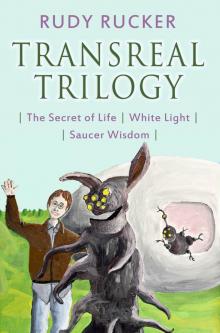 Transreal Trilogy: Secret of Life, White Light, Saucer Wisdom
Transreal Trilogy: Secret of Life, White Light, Saucer Wisdom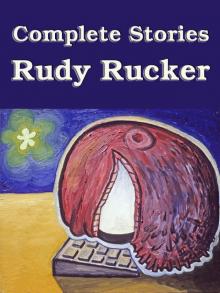 Complete Stories
Complete Stories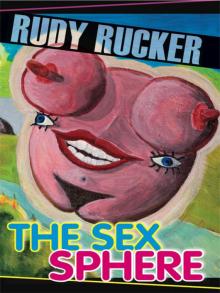 The Sex Sphere
The Sex Sphere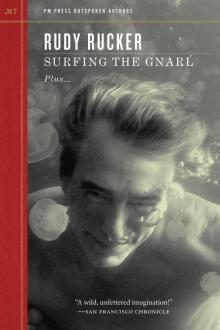 Surfing the Gnarl
Surfing the Gnarl Software
Software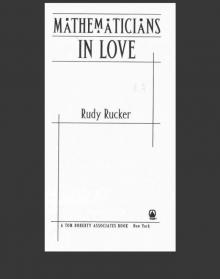 Mathematicians in Love
Mathematicians in Love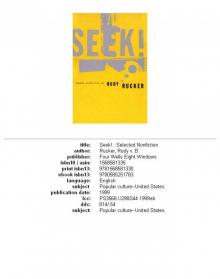 Seek!: Selected Nonfiction
Seek!: Selected Nonfiction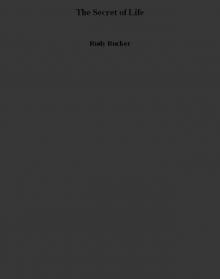 The Secret of Life
The Secret of Life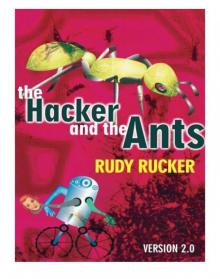 The Hacker and the Ants
The Hacker and the Ants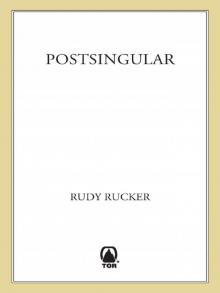 Postsingular
Postsingular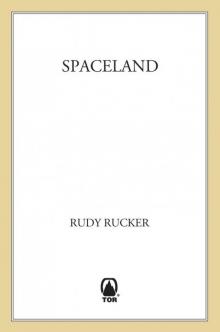 Spaceland
Spaceland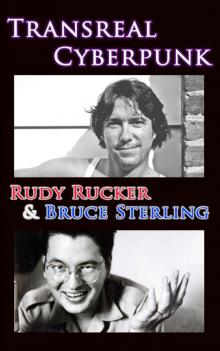 Transreal Cyberpunk
Transreal Cyberpunk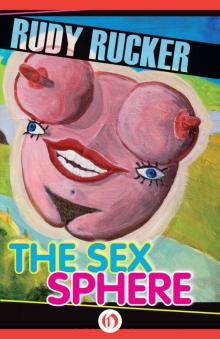 Sex Sphere
Sex Sphere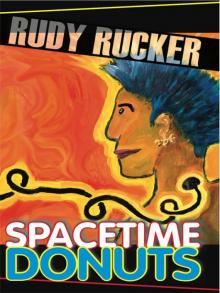 Spacetime Donuts
Spacetime Donuts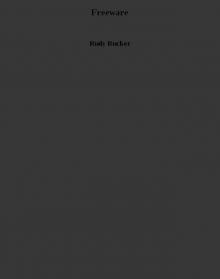 Freeware
Freeware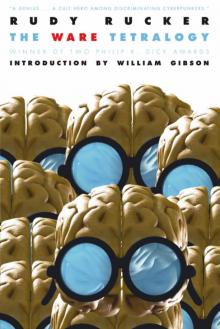 The Ware Tetralogy
The Ware Tetralogy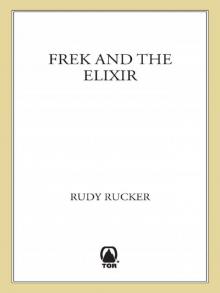 Frek and the Elixir
Frek and the Elixir Junk DNA
Junk DNA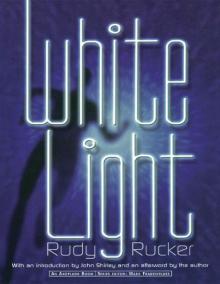 White Light (Axoplasm Books)
White Light (Axoplasm Books)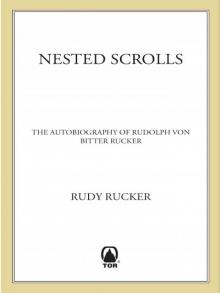 Nested Scrolls
Nested Scrolls Inside Out
Inside Out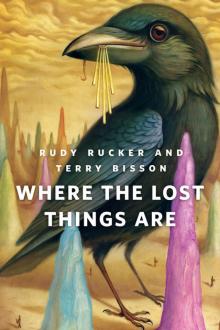 Where the Lost Things Are
Where the Lost Things Are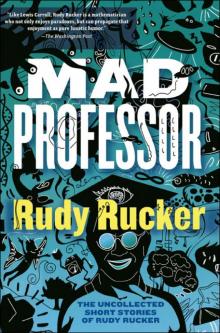 Mad Professor
Mad Professor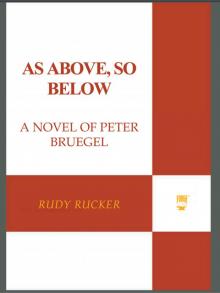 As Above, So Below
As Above, So Below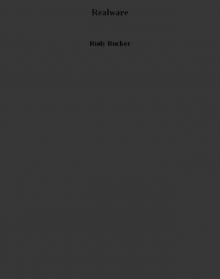 Realware
Realware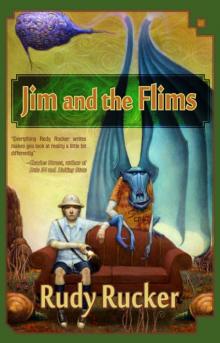 Jim and the Flims
Jim and the Flims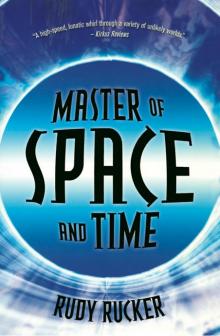 Master of Space and Time
Master of Space and Time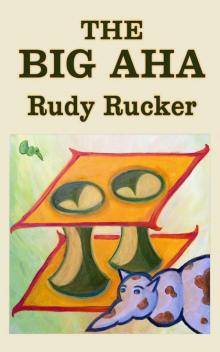 The Big Aha
The Big Aha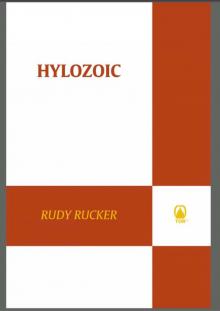 Hylozoic
Hylozoic